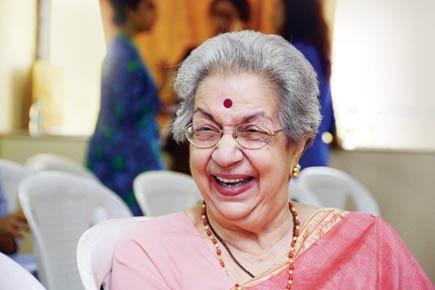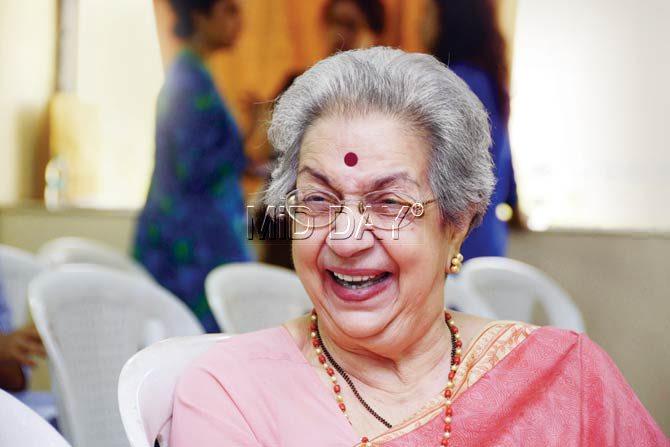As octogenarian legend Dr Vijaya Mehta readies to kickstart an advance workshop for theatre professionals, she hits the rewind button to her early days on stage, and why it's important to have an observer programme in today's times

Making a tacky plastic chair look almost regal with her grace, 81-year-old Dr Vijaya Mehta is in her element while announcing her latest venture, a workshop for mid-level theatre professionals. Though stately, the twinkle in the eye and the naughty smile offer a glimpse of her vivacious side and put us at ease instantly. Winner of several national and international awards including the Padma Shri, Sangeet Natak Akademi Award, Rashtrapati Puraskar, and the Maharashtra Gaurav, Mehta has mentored the likes of Nana Patekar and Vikram Gokhale, and is now all set to train gennext. Excerpts:

Dr Vijaya Mehta
ADVERTISEMENT
Q. Tell us about Indian theatre in the 1940s.
A. I was fortunate to be a Renaissance baby. I was 12 years old when we got Independence (don’t calculate my age!). It’s when everything exploded. We were the first young generation — the teenagers of Independent India. We needed to have our identity. We were surrounded by the need for exploration of creativity in literature, painting and theatre. Theatre had gained momentum in Europe for different reasons. World War II had devastated many European countries, and as a result, there was the need to express. So, theatre grew. We inherited that restlessness and tried to find new ways of expression. At that time, it wasn’t about popularity or money; there was none. It was about the need to understand and grow.
Q. You came from a cinema background...
A. I was a Jaywant. There were two famous Marathi actresses: Nalini Jaywant, my cousin’s daughter and Shobhana Samarth (Tanuja and Nutan’s mother). She was my sister-in-law. When they knew I wanted to act, they assumed Baby (as I was called then) would join films too. Nobody told me not to but I was totally absorbed by theatre. I was also not interested in the kind of cinema being made then. Cinema changed a lot later. It’s a personal decision. It is natural if you do well in theatre to move to cinema because it is a larger canvas but you need to be sure about the kind of cinema. You have to find maturity in your own art form. The money and fame has to follow and not the other way round.
Q. Did you study theatre professionally?
A. I am learning even today. Whatever you learn in a creative art form is never enough. The more you grow in the process of understanding and perception, the more is the necessity to learn. I went in search of gurus who were stalwarts of Marathi theatre. I did my first play, Othello when I was 18; the actor who played Othello was 60. They had a fund of knowledge. I went to Ebrahim Alkazi to watch how plays were conceptualised and written. From then, I went on a rampage and I grew. I travelled to to Germany and the USA. Of course, I was also invited, but wherever I went, I attended workshops. I learnt how to appreciate one’s gifts and develop them. I watched Peter Brooks during the making of The Mahabharata. It’s important to see the manifestations of various art forms that you are so interested in. If you are genuinely into something, your learning never stops.
Q. Is theatre able to compete with the entertainment options available today?
A. At one point, people believed that television and video would completely sweep theatre because it was available at home. The human mind and its sensitivity, however, showed that after 10 years, theatre emerged much better defined. People went to the theatre to avoid what was dished out to them on television. National theatre became an international event, and then television borrowed from it. In all performing arts, there is a cycle. There is a peak and a plateau. It’s not just in India but everywhere. Like in cinema, the peak at that point was Satyajit Ray. Nothing is permanent. It goes and comes back. It has to learn and rise to its potential.
Q. Will you work with a playwright/director from the younger generation?
A. In all my years of working, I was very choosy. I had to agree with the playwright’s ability to take of layers of experiences. I have only worked with five playwrights — Vijay Tendulkar, Chintamani Tryambak Khanolkar, Jaywant Dalvi, Mahesh Elkunchwar and Vasant Kanetkar. If something comes my way and if I like it, I might.
Q. What makes this programme different from others?
A. I was Chairperson at National School of Drama for four years. These workshops are not as structured as the theatre courses available. There are no lectures. I learnt the most as an observer. We don’t have that system but in many places including New York and San Francisco, there are workshops where you pay to watch a director from theatre or film; to see to them rehearse and work on a scene. It’s tough to get a seat. I learnt so much from watching Peter Brooks doing improvisations with his actors. I learnt a lot about sequencing. That is what we want to do. Observers, at times, learn more than participants. It’s designed for people who have already decided that they want direct, act etc. That’s when you need to take decisions and make choices about the right way. It’s been my quest.
Q. Was there a difference between the regional and English theatre that you did?
A. There was never a regional difference. The advantage that Marathi theatre had was that we worked with manuscripts. We hardly had any printed scripts. In Bengali theatre too, because of continuity of tradition, we had many original plays to work with which was our advantage. In English and Hindi that wouldn’t always happen. When I was growing, there were people from across India doing similar work. Except that I was fortunate that I had Vjay Tendulkar and Chintamani Tryambak Khanolkar to write for me. They had to find somebody.
Q. Did you enjoy working with adaptations?
A. They have to be extremely well done otherwise they misfire. I have done some that didn’t work. They had great star casts. We thought people would flock to the theatre but they didn’t. I played a rebel queen once in a play with Rangayan, which was a great example of melodrama. I was draped in saree because it was an adaptation. People couldn’t identify with it. There were no queens here who ran away. It was a Russian queen. I haven’t done too many apart from experimentations.
From: May 2 to 6, 10 am and 4 pm
At: Mini Auditorium, Ravindra Natya Mandir, Prabhadevi.
Call: 24365990
 Subscribe today by clicking the link and stay updated with the latest news!" Click here!
Subscribe today by clicking the link and stay updated with the latest news!" Click here!







